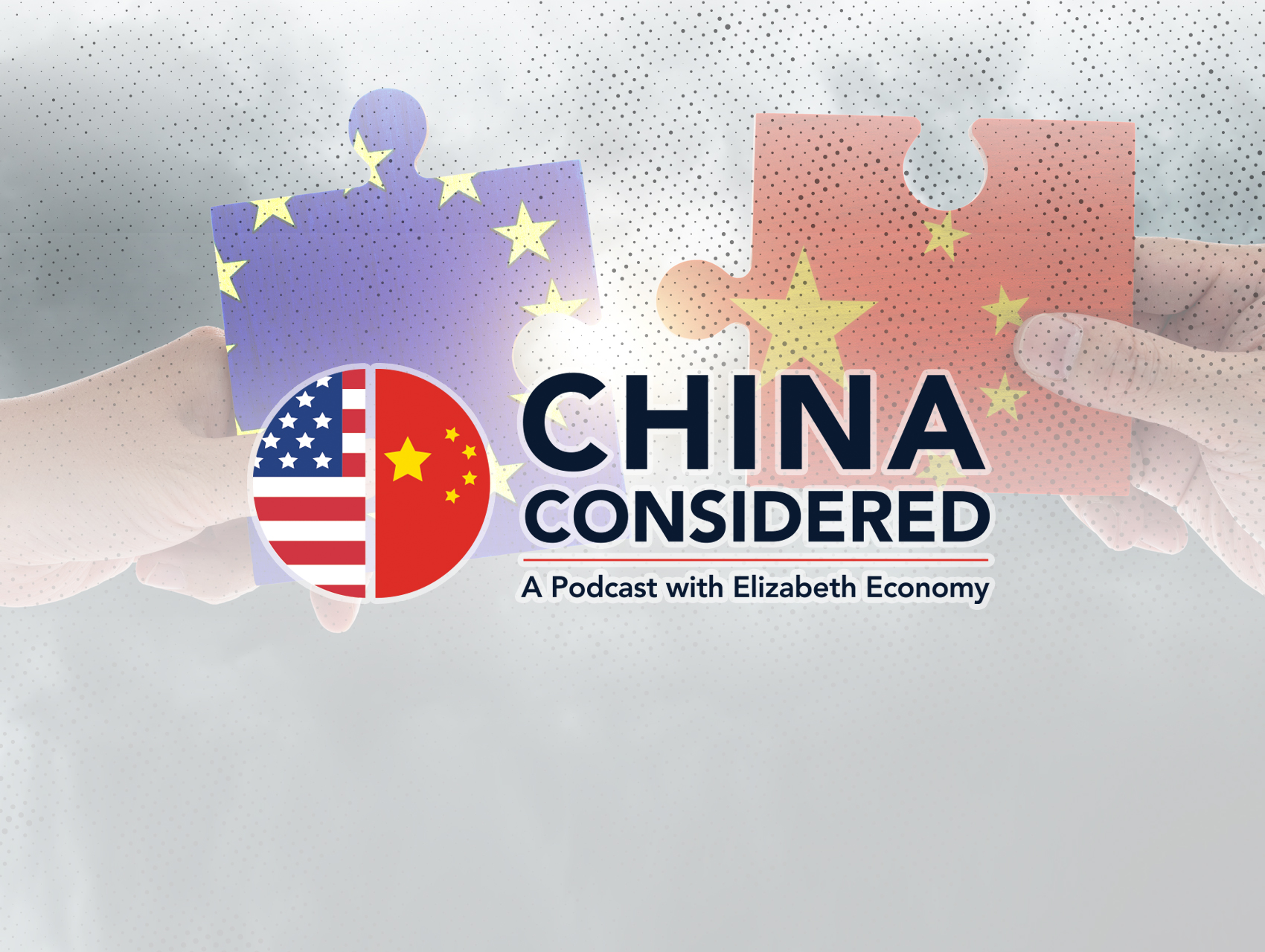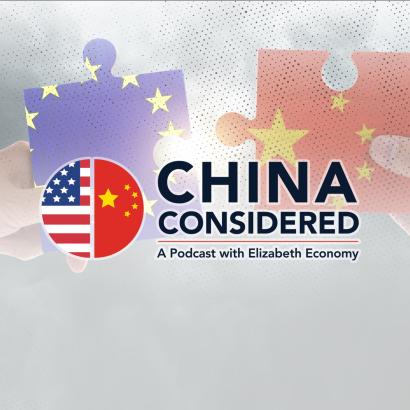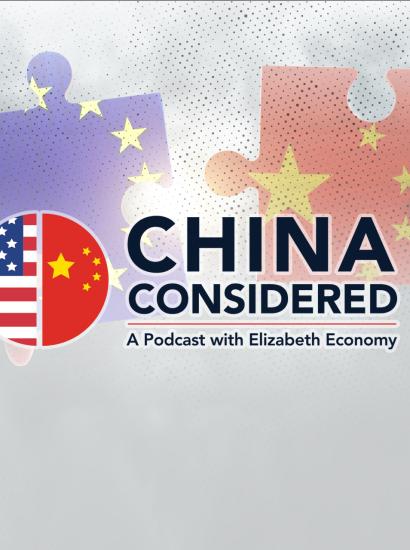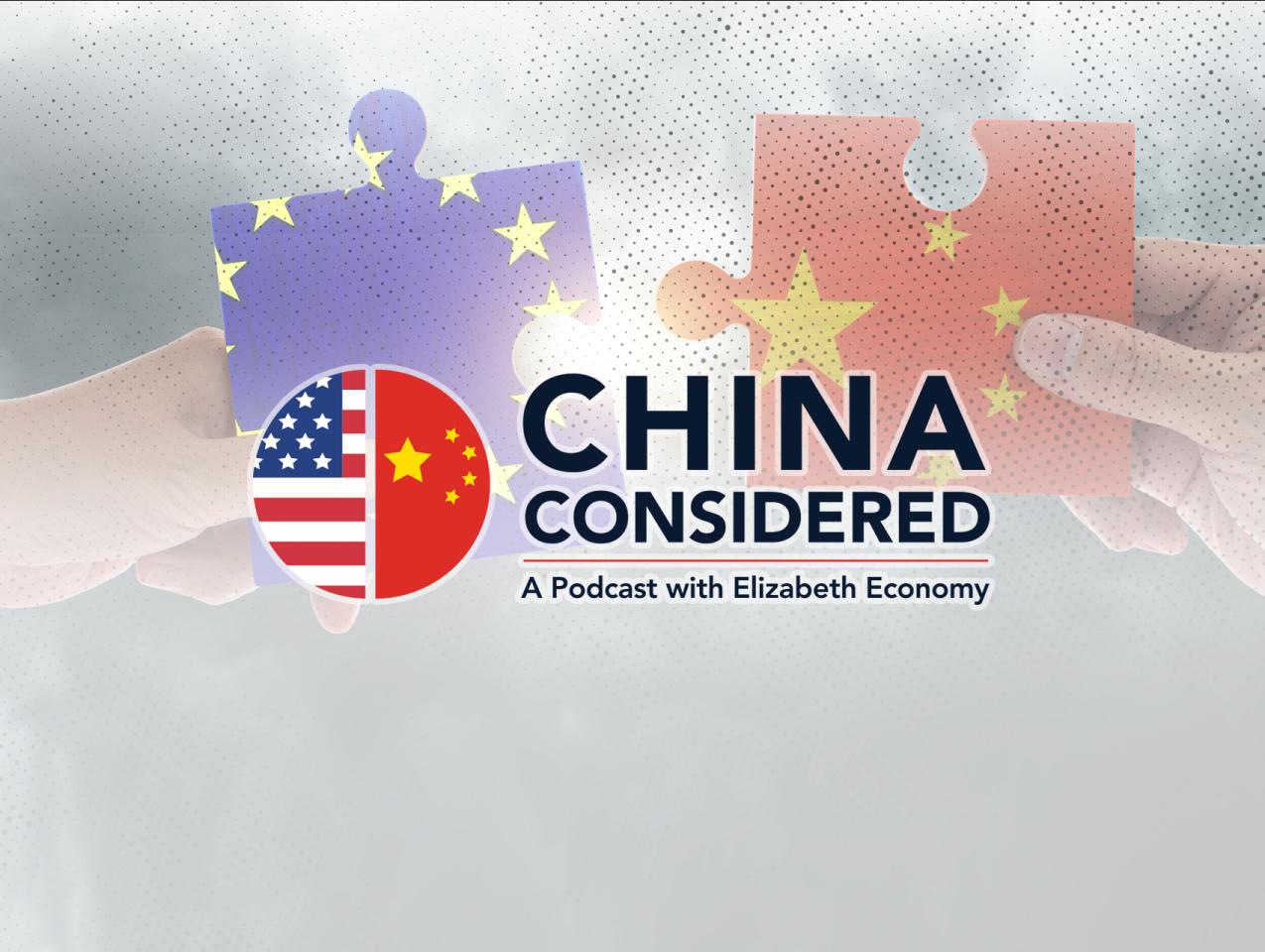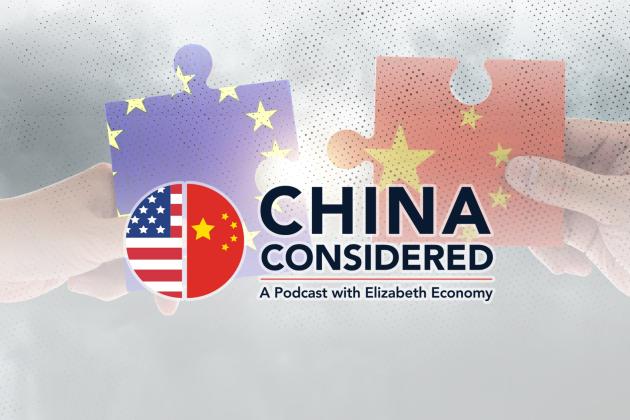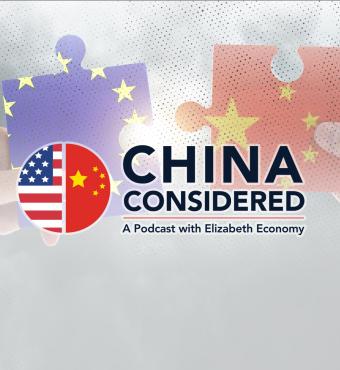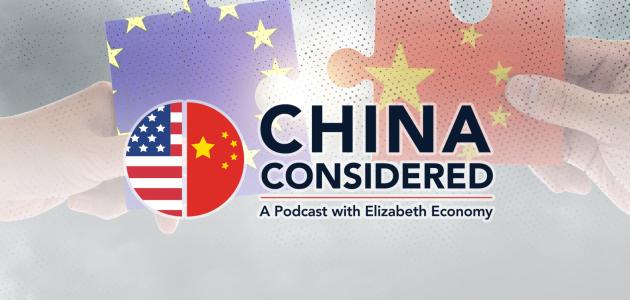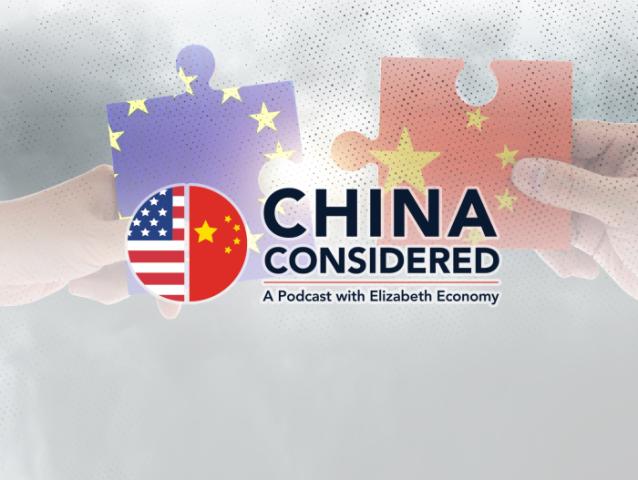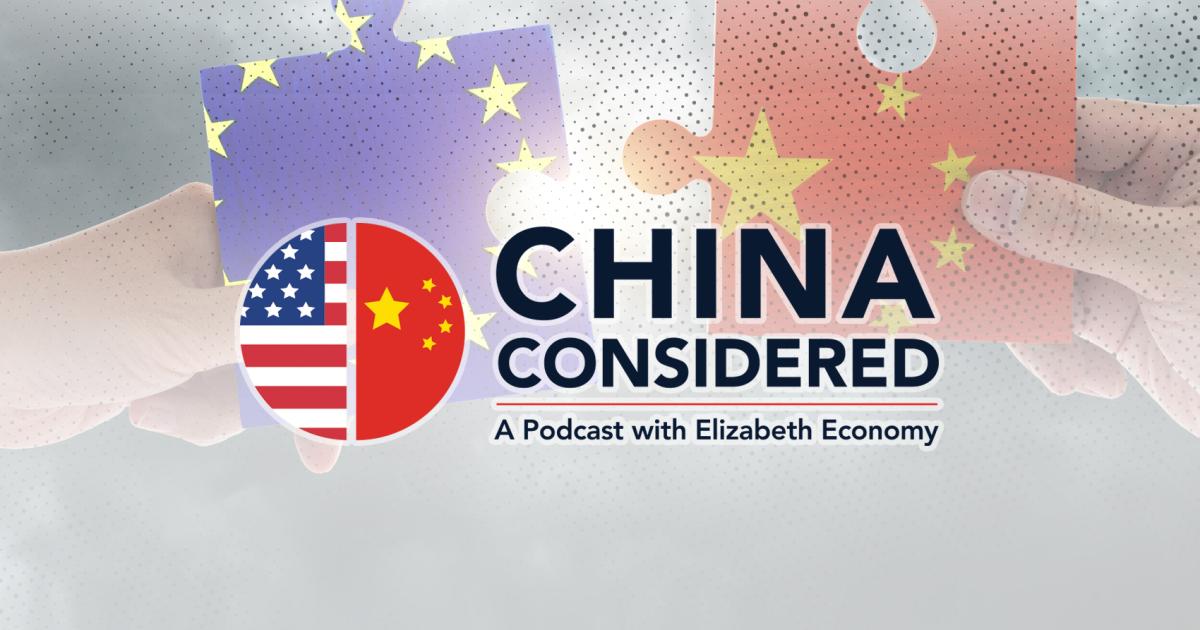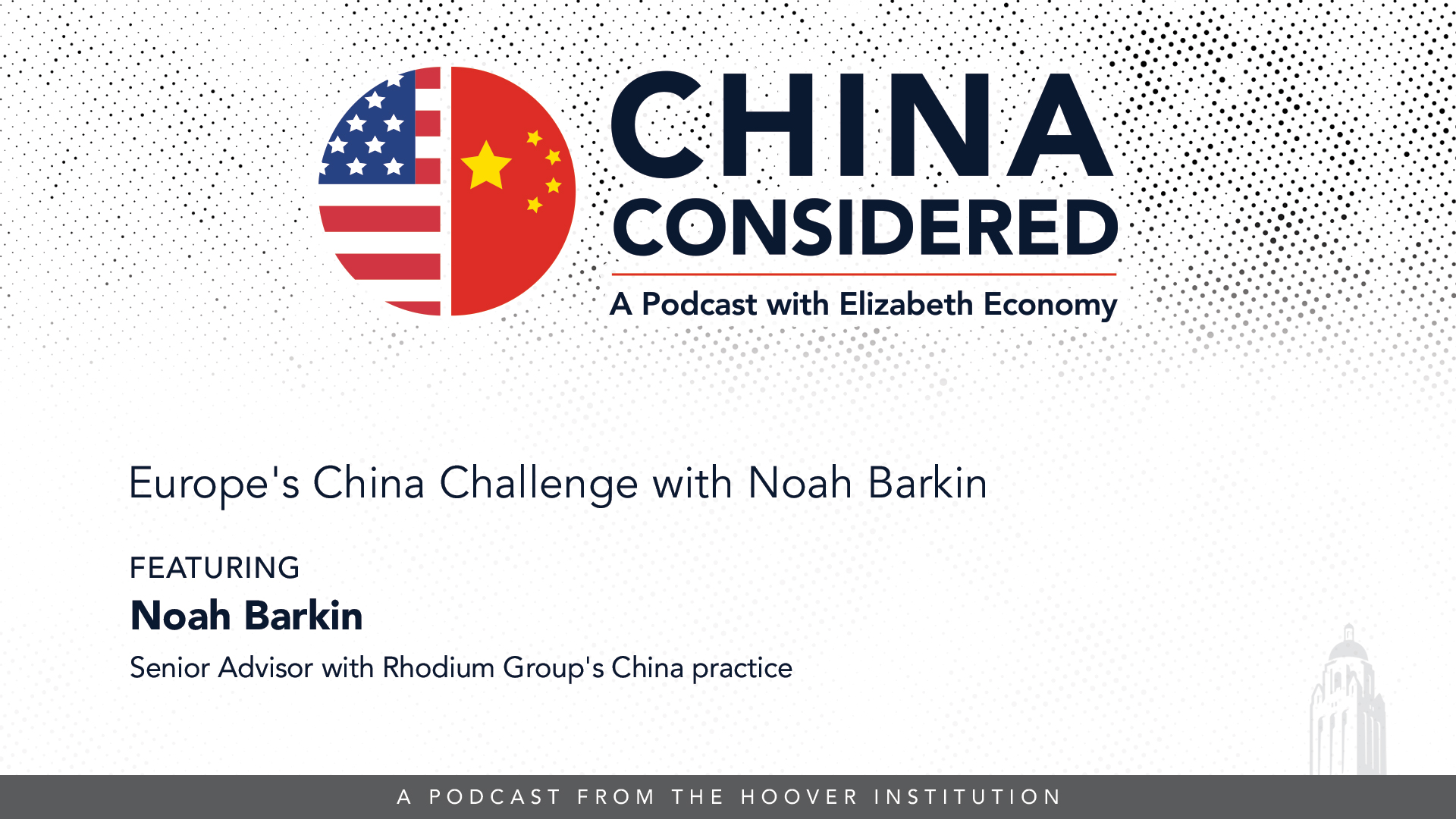- China
- US Foreign Policy
- Confronting and Competing with China
Host Dr. Elizabeth Economy interviews Noah Barkin, senior advisor with the Rhodium Group, about the evolving EU-China relationship following their July 2025 summit celebrating 50 years of diplomatic ties. Barkin traces Europe's awakening to the China challenge and China's designation as a "systemic rival" in 2019, explaining how the EU has developed its own distinct approach to managing Chinese economic competition. The conversation explores why China's strategy of leveraging Trump-era U.S.-Europe tensions to drive a wedge between allies has largely failed, with Europe maintaining its critical stance on issues like Chinese overcapacity and support for Russia. Barkin discusses the different approaches among EU member states, the significance of China's rare earth controls, and Wang Yi's surprising admission that Beijing wants to keep the U.S. "distracted" with the Ukraine war. Drawing on his expertise from Berlin, Barkin offers insights into whether Europe can maintain unity on China policy and what tools the EU needs to address the growing economic and security challenges posed by Chinese behavior.
Recorded on July 29, 2025.
>> Elizabeth Economy: Welcome to China Considered, a podcast that brings fresh insight and informed discussion to one of the most consequential issues of our time, how China is changing and changing the world. I'm Liz Economy Hargrove, Senior Fellow and co-Director of the program on the U.S. china and the World at the Hoover Institution at Stanford University.
Today, we're going to focus on the relationship between the European Union and China, with a dash of the United States and Russia sprinkled in. July was a big month for the EU. It celebrated 50 years of diplomatic relations with China and it signed a trade agreement with the United States, all while continuing to support Ukraine in its fight against Russian aggression.
So to help us understand how the EU is keeping its head above water with all that's going on, going to speak with Noah Barkin, who is a senior advisor with the Rhodium Group as well as a visiting senior fellow with the German Marshall Fund. He's based in Berlin, but we're lucky to get him while he's visiting here in the United States.
Welcome, Noah.
>> Noah Barkin: Hi, Liz. Great to be here.
>> Elizabeth Economy: So the big news in EU China relations is the summit that the two sides had in late July, celebrating 50 years of diplomatic relations. I want to get your take on what happened, what you think is coming next, but first let's level set the relationship.
If you look back over the past decade or even more, what do you see as the defining moments in the relationship? How should we understand the evolution of the bilateral relationship?
>> Noah Barkin: Well, I think looking at it from a European perspective, I would maybe start with the takeover by Chinese for media of German robotics maker Kuka in 2016.
The German government tried to stop this but didn't have the tools to do so. So I think more than any other single event, that was the moment when Europe began to understand that deeper economic ties with China posed a substantial risk. And I think it was also the moment when European capitals realized that they needed new instruments to deal with this threat.
Other events in recent years, I think back in 2019, the European Commission published a document, Strategic Outlook on China, which labeled China a systemic rival. That was a big shift, I think, in how Europe thought and described China. I think Europe had always sort of soft pedaled its rhetoric on China and that was sort of a break from that and a signal that Europe was going to be talking, calling a spade a spade, talking a bit more frankly about the relationship.
The pandemic had a big impact, of course. I think that triggered a sort of a slide in public opinion in Europe towards China. And then of course, The China's support for Russia, the no limits partnership that Xi and Putin struck just shortly before Russia's full scale invasion of Ukraine.
And China's ongoing support for Russia has had a huge impact on Europe-China relations. And I think ever since European Commission President Ursula von der Leyen gave this speech back in 2023 where she talked about de risking as the primary strategy towards China, I think we've seen a ramping up on the European side of economic measures to push back against China.
I think that speech was also significant in that it, it signaled a more robust European approach to some of the economic challenges related to China.
>> Elizabeth Economy: I remember that speech. I was at the Commerce Department at the time and it was such a great framing, that notion of de risking not decoupling, that of course we adopted it as well.
I think that's become the frame for the US Let me just ask you a little bit more about that first event that you mentioned, which was the Chinese investment, I guess, and really takeover of Kuka, their German robotics firm in 2016. Was it that they suddenly realized the Europeans and the Germans suddenly realized that China was a much bigger economic competitor than they had sort of assumed, or was there a national security element to this?
Just what, what was the awakening all about? Would it have had the same impact, for example, if it had been a US firm that had come in and you know, bought, bought this out?
>> Noah Barkin: Well, I think it was a realization that China was employing a sort of top down strategy.
Of course, made in China. 2025 was launched a year earlier. There had been other takeovers that had caused concerns. You might remember back in the Obama administration there was an attempt to take over a German semiconductor firm, Extron, where the Obama administration intervened because the Germans were going to approve that and that deal was reversed in the end.
But it was the sense that, and Chinese investment in Europe at the time was at a peak, 2016, 2017. I think it had been welcomed for many years. It was seen as a good thing. And suddenly there was a realization they are buying up strategic assets as part of a top down strategy to become dominant in a set of key industries of the future.
This was a key moment, I think in how the German government thought about this and thought about Chinese investment and, and thought about the risks of Chinese companies buying up strategic European assets. And that triggered the development of a number of tools and it ultimately led to this strategic Outlook document that I mentioned where China was labeled a systemic rival.
>> Elizabeth Economy: Right, that was a big moment. So you mentioned the Obama administration intervention and I know again during the Biden administration. And I think even during the first Trump administration, there was a lot of effort expended to, quote, let's put it in quotation marks, educate the Europeans about the nature of the economic and security challenge that China presented.
To what extent do you think the European relationship with China has either mirrored the US Relationship? Has it trailed behind by a couple of years? How do you see the two, if you were to juxtapose one against the other, how do you see the two of them?
>> Noah Barkin: Well, it's an interesting question, Liz, because I think there is a lot of confusion, especially in the U.S. i think, about how European policy towards China has evolved.
I think there is a narrative out there that Europe only got tough on China because of the US because of pressure from the first Trump administration, then pressure from the Biden administration. I think you can certainly find evidence. That US Pressure had had an impact on European policy in certain areas.
I'm thinking of, you know, the 5G debate and the role of Huawei in 5G networks, obviously on export controls, the restrictions on sales of chip making equipment from the Netherlands, asml, et cetera, to China, or the debate about outbound investment screening. These are areas clearly, these themes were driven by Washington.
But I think we do tend to play down Europe's agency in all of this. I think the EU has been very aggressive in developing its own tools distinct from those in the US to try to level the playing field with China. The foreign subsidies regulation, for example, is, is a quite powerful tool that I think we'll be hearing about more in, in the, in the coming months and years.
Europe moves slower than the U.S. you know, 27 countries, they need time to, to get on the same page. It's more wedded, as you know, to tools that conform to WTO rules. It does not have the ability to decide from one day to the next with an executive order that 100% tariffs on China are going to be imposed.
So, I mean, I would argue that Europe has at times been too slow, but I think there's also an argument that policy has been more coherent than that of the US at times. I think Europe's aim has been to slowly dial up the pressure on, give Beijing a chance to change its behavior.
I think the US has probably decided, or at least the Biden administration decided that that time had passed to give China a chance. But that said, I do think that we are going to see the EU take more aggressive measures over the coming year because I think its industry faces really an existential threat from China.
And I think that's going to become more obvious in the months to come.
>> Elizabeth Economy: Yeah, actually, I think that's a really important point about the care in some ways with which the European Union tries to think through its policy toward China and the tools that it uses. I really appreciated, for example, the, the nuance with which they approached their EV tariffs on China.
Now, one could say that they did it in a nuanced way by tracking all the subsidies from the coal on to the actual manufacturing of the EVs. But in the end, you know, they ended up with what, 35 or 40% tariffs, which probably not enough to keep, you know, a flood of Chinese EVs to coming to come into the EU as opposed to the US where we just slapped on 100 tariff and you can't find practically a Chinese EV on US street.
So I don't know which one is better, but I really do like sort of the. The intellectual seriousness with which Europe approaches how it. It, you know, tries to bring China more in line with international norms. So let's turn to the summit now. You had European Council President Antonio Costa and European Commission President Ursula von der Leyen traveled to Beijing, you know, for this summit.
Before we talk about it, can you explain what the difference is in their jobs and whether or not the two of them are on the same page when it comes to China? Not sure. Many people really understand the nature of the EU and its various bodies.
>> Noah Barkin: Yeah, it can get very confusing with all the different institutions in Brussels.
But I think the easiest way to understand this is that the European Commission president is really the driver of EU policy. The Commission proposes new legislation, it is in control of trade policy, for example. The European Council president, on the other hand, Antonio Costa, is in the position now, is there really to represent the interests of the 27 member states.
He oversees the quarterly European Council meeting, so meetings of European leaders, and in an ideal world, these two positions, European Commission president, European Council president, work as a team. I think that was the case in the past with, for example, Jean Claude Juncker, who was European Commission president before von der Leyen, and Donald Tusk, who was European Council president, now Prime Minister of Poland.
Poland. It was definitely not the case in the last commission. Von der Leyen and Charles Michel, who had the European Council role, couldn't stand each other on a personal level. And they were at odds on policy, including on China, where Michel favored a much softer line. So I think it's early days for von der Leyen and Costa, but by all accounts, they get along.
Of course, Costa was Portuguese Prime Minister before. Before he knew Funder Leyen well when he came into the job. And I think the way they coordinated messaging at the summit in Beijing, that went quite well, I think.
>> Elizabeth Economy: Okay, so I remember maybe six months ago, there was a lot of anticipation about this summit, a sense that there was the opportunity to kind of give a little bit of a reset to the EU China relationship.
But maybe starting two months ago, that seemed to be less and less the case. The summit itself seemed to shrink in terms of its duration. I think it lost a day. Correct me if I'm wrong on the front end. What were the expectations of both sides coming into this summit?
What did they want? Did they think that anything was going to come? As Costa and von der Leyen were getting on the plane to go to Beijing what was in their heads.
>> Noah Barkin: Yeah well I mean as you mentioned I think if you go back a few months ago to April there were expectations on both sides that the summit might produce something concrete if not a trade truce I think perhaps the beginnings of a sort of a pathway to to a to a trade truce Heading into the summit I think China's key demand was the removal of the EU's duties on on Chinese electric vehicles the EU had a very long list of demands the removal of China's retaliatory measures on brandy dairy and pork better market access assurances that Chinese FDI in Europe would add value would create jobs assurances that Chinese overcapacities would not be flooding into Europe and of course a commitment from Beijing to prevent the export of dual use goods to Russia these were the positions that the two sides were coming from I think China always likes to send a message of EU Chinese unity and I think as in the past the pictures of the leaders together can often be.
More important for China than for Europe. Europe was very reluctant to go to China and send images into the world of EU leaders talking with Xi and working together with the Chinese leadership, but without real deliverables. So in the end, I think neither side got what it wanted.
I think there were two main reasons for that. First, China emerged from the trade spat with the US emboldened to a certain extent. I think back in April. They were quite eager to work with Europe when they were under intense pressure, intense trade pressure from the U.S. tariffs, of course, were as high as 145% on the U.S. side.
But after the Geneva meeting, the London meeting, I think they felt they had stared down the US and emerged intact, if not with the upper hand. So there was less incentive to make concessions to Europe. I think second, and this is related to the first issue, was the havoc that was wrecked by China's rare earth controls in Europe.
Not only in Europe, but this also had a big impact in Europe. And this sort of poisoned the well, I think, in the months leading up to the summit. And it was another reason why Beijing was not really in a mood to compromise. It had Europe and other countries in a bit of a vice.
And Europe was furious about these controls, which, of course, Europe was to a certain extent, collateral damage because they were aimed primarily at the us. But in their conversations with their Chinese counterparts, it was clear that this was not a complete accident. And China was demanding other things from Europe in the run up to the summit in exchange for loosening the rare earth control.
So that really poisoned the well, and it left both sides. There was a bit of an escalatory dynamic in the run up to the summit. In the end, the summit was almost like a carbon copy of the summit, the last summit in December 2023, a standoff with no real deliverables.
There was a joint statement on climate, which was fairly empty. There was a pledge to ramp up dialogue on export controls, code for the rare earth issue. But I don't think anybody expects that to produce anything concrete. I think most significantly, there was no indication that the EU and China are making any progress towards resolving their trade dispute over EV tariffs.
I think that's here to stay. And the term that sort of came, you know, will remain in our memories after this summit was inflection point. Fonderlyen said that the relationship was at an inflection point, and I think that heralds a tougher EU line in the months and years ahead.
>> Elizabeth Economy: Yeah, she's very good for coming up with the phrases of the task. You know, you and I have been at some of the same conferences with, you know, Americans and Europeans and Chinese over the past six months. And, you know, one of the things that has surprised me, you know, I have to say, you know, in a positive way, has been despite the sort of, you know, challenge that President Trump poses to Europe and sort of the chaotic nature of policymaking here.
I think. Maybe both of us would agree that the Chinese saw an opportunity in that to try to wean Europeans away from the United States because of that. But that's not what has happened. And I'm wondering if you have a sense for how the Europeans are thinking about their space in between the US And China.
Why, in fact, China hasn't been that successful in bring the Europeans along because certainly the Trump administration has, you know, not been kind to Europe.
>> Noah Barkin: Yeah, yeah, yeah. I mean, I did. I did think a few months ago that Trump had the potential to push Europe and, and China together.
Back in January, I think it was January 20th, the day Trump was reentering the White House. Also the day that Ursula von der Leyen appeared in Davos at the World Economic Forum. She gave a speech which was a bit of a rhetorical break from the past. She had become known as the sort of the main China hawk in Europe.
And she talked about, in that speech about perhaps boosting trade and investment ties with China under certain conditions, which was a new message because she'd been talking about de. Risking and reducing trade and investment for the past couple years. So that sort of indicated that the Europeans were trying to, I think, leave the door open to China.
But I think what I just described in the run up to the summit, sort of China being unwilling to make any substantive move towards Europe, we did see some measures. We saw, for example, the removal of Chinese sanctions on members of the European Parliament. And we saw, for example, I think the head of Marix, Miko Huatari, just was in China a few weeks ago.
He was also under sanctions. So China is signaling that it is taking some symbolic steps to reach out to Europe. But on the issues that Europe really cares about, which the trade relationship and China's support for Russia, it hasn't moved at all. And I think often in Europe, maybe in the west, we tend to think, China has a brilliant opportunity here to drive a wedge between.
Between the US And Europe and reach out to Europe. But I'm not sure in Beijing they're thinking about this in the same way. I think they think they have a huge amount of leverage with Europe and they don't need to make concessions. And they can sit back and watch Trump drive a wedge between Europe and the US Rather than try to do that themselves by offering concessions to Europe.
So that's how I interpret it. I'm sure you have a view, Liz, but I think China is just not in the mood to make any concessions to Europe at the moment. And I think that was clear from the summit.
>> Elizabeth Economy: Yeah, I think maybe my view goes back to a point that you made earlier, which is that Europe has its own agency.
And so in that sense, Europe, as you say, has serious concerns about Chinese overcapacity and Europe being flooded, as the US has the same concerns, not only with solar panels and evs and batteries, but. But looking ahead to legacy semiconductors and new materials and everything else that's on that made in China 2025 list from back in 2015.
So I think that's one. And then I think from, you know, from what I've understood again from the meetings, you know, that you and I have been in together, you know, the really that red line is Chinese continued support for Russia and Europeans simply cannot accept, you know, or cannot think about a real, you know, coming together of EU China relations when China is so actively supporting, you know, the main aggressor in Europe.
And Europe has real fears, I think, of, you know, what might come next, you know, you know, in a sort of if, if Ukraine does not, you know, stand as a sovereign state after this. So I think, you know, to me that's really the heart of it, is just that Europe has its own issues with China now, and it's not about simply aligning with the United States or with what the US Wants.
And Beijing has always had a hard time understanding or acknowledging sometimes. I think some, some analysts in China do understand that Europe does not simply agree with everything that the United States says and doesn't simply follow the US and it's just convenient for them to say that Europe is an agent of the US and it needs its strategic autonomy.
But I think that's really probably, for me, in any case, that's really the sort of most salient point is that Europe, especially now with the Trump administration, has carved out and will continue to carve out its own China policy. And that's, I think, you know, pretty essential for not only for China to appreciate, but probably for those of us in the United States to appreciate as well.
So let me just talk and I'll ask you a little bit more about the China, Russia dynamic and why you think that China has held on so firmly to its support of Russia in the face of both, you know, EU and US Condemnation as well. As, you know, there are certainly analysts within China that are critical of Xi Jinping's decision to support Russia as opposed to align with the US as you look at the two, meaning Russia and China, do you think there's anything that might drive a kind of schism between the two of them?
Or is this, you know, really, you know, the no limits partnership?
>> Noah Barkin: Well, I'm not, I'm not an expert on China's relationship with Russia, but I think that more than three years into Russia's full scale war with Ukraine, we should stop speculating about a split between Beijing and Moscow.
It's not Happening. On the contrary, Beijing is becoming increasingly defiant, I think, about its support of Russia. There was reporting from the South China Morning Post earlier this month that Wang Yi, the Chinese Foreign minister, made very clear during a meeting with the EU's top diplomat, Kayakalis, in Brussels in early July that Beijing wants to keep the US off balance and distracted with the war in Ukraine.
>> Elizabeth Economy: That was an incredible statement, right?
>> Noah Barkin: Incredible statement.
>> Elizabeth Economy: That was just, I think, a very atypical moment for Wang Yi where he really thought.
>> Noah Barkin: Yeah.
>> Elizabeth Economy: True thinking of China. Sorry.
>> Noah Barkin: Exactly, and she, according to the people in Brussels that I've talked to, expressed some exasperation at the EU China summit with the EU complaints about China's support for Russia.
China has made very clear that it's going to retaliate against Europe for, for its sanctioning of two regional banks for facilitating ban trade with Russia. So I sense maybe a shift in the early years of the war. China was sort of denying, deflecting. No, we don't support Russia.
We don't like what Putin is doing. We just want peace. And that message is shifting a little bit. Certainly in the private conversations. I think there is more defiance from a European point of view. I don't think this is heading in a better direction. Can one come up with scenarios in which, were Putin to move into NATO territory, how would China react to that?
You know, if, if the US were to ramp up sanctions and get serious about confronting Russia, which I'm still very skeptical about despite some of the recent rhetoric from, from Trump, you know, could that weaken Russia and could that. I think China doesn't want Russia to fail, but I, my, my sense is that we should not be counting on some sort of split between China and Russia anytime soon.
China clearly has a strategic interest in supporting Russia, working with Russia and distracting, I think, Europe and the US from focusing on China, which is perhaps the bigger long term challenge.
>> Elizabeth Economy: Right? And to that end, what about the sort of larger Indo Pacific security region and Europe's interest?
You know, I think the Biden administration certainly worked hard to take what I think was nascent interest in the EU in sort of Indo Pacific security. I mean, they'd all long had an interest in the region for economic relations, for trade and investment, but the security, I think, aspect of it was relatively new.
How is the EU looking at the Indo Pacific today? Do you sense that sort of given continued Chinese military aggression in the South China Sea, Taiwan, Japan, that the EU is becoming sort of more interested in becoming more engaged, or is it sort of like we've got enough going on now with Ukraine and Russia, and we can't afford to have our attention diverted here to be thinking about enhancing our role in Indo Pacific security.
>> Noah Barkin: Yeah. I do think that Europe has a lot on its plate at the moment. At the same time, I think that we have seen over the past few years a greater acknowledgement that the Indo Pacific is a vital interest for Europe. So we've seen. We've seen Germany last year sending a frigate through the Taiwan Strait, the first time in over 20 years.
I think the Dutch did the same earlier in the year. So these are really symbolic steps of course. France is the only EU country that plays a real security role in the Indo Pacific because of its overseas territories there. So I think it will remain a priority. I think one, one thing.
Thing beyond the security realm is that we've seen a ramping up of engagement in the Indo Pacific at the diplomatic level. You know, in Germany, for example, Asia was China for many, many years. I think Angela Merkel went to Japan two or three times in her 16 years.
Maybe I'm getting that wrong, but it's a very small number. Whereas she was in China at least a dozen times. That has shifted. And we're seeing more European leaders travel to Japan, travel to Korea, travel to India, travel to Southeast Asia. So I think the engagement is increasing.
I am a bit skeptical about whether Europe can play any sort of major role beyond a symbolic role in the Indo Pacific. I think, I think it should continue to do this. And we've had debates, I think, at some of the recent conferences we've been at about this, because the message coming from the Trump administration, at least certain figures, Elbridge Colby, people like that, is very much Europe should focus on its home front and not get involved in the Indo Pacific.
I think it's important that Europe does remain engaged, even if its security role in the region is likely to be certainly a lot more limited than the United States.
>> Elizabeth Economy: Yeah, I think many people in the US in previous administrations, including in Trump, one, would agree, despite what Bridge has to say, that having a greater degree of European security engagement in the Indo Pacific is, frankly, all upside from the perspective of the US And I think for the countries in the region as well.
So, Bridge's comment, I think, has been interpreted in many ways. I think the most generous interpretation is simply that, in fact, Europe, for the moment, because it does have a war right in its home to address, should focus on that for now. But yes, and so without a further explanation from Bridge, we are left to just try to figure out what he might have meant.
But I can kind of take from the response of certain people who were in the meeting that they were very taken aback at the time by his remarks. Let me ask you another question about the EU. And obviously you mentioned 27 member states, and they don't all have the same approach to China, right?
How different, you know, is you, you've been sitting in Germany now for a number of years, and German has traditionally been certainly at the forefront of the economic relationship and an advocate for a strong, you know, eu, China relationship. You mentioned Angela Merkel and her intense, you know, interest and leadership, really, I think, within the EU on the economic front, driving for the comprehensive agreement on investment a number of years ago.
How, what do you see as sort of the range of views among the member states Today, are we talking about a fairly narrow band or are we, you know, are we 180 degrees apart from, you know, Hungary to a Lithuania?
>> Noah Barkin: Yeah, well, I mean, I think you have, you could call them maybe opportunists in a country like Hungary.
Increasingly, Spain, I would say, falls into this, this camp willing to sort of compromise on policies, whether it's sort of electric vehicle duties or something else, in order to ensure that Chinese companies make investments in Spain. But my sense is that maybe we play up the role of a country like Hungary a bit too much.
I think there is a growing consensus among the big states, Germany, France, the Netherlands, that China poses a growing threat both economically and from a security perspective. I think if these countries are on the same wavelength, then I am less worried about countries on the sort of dovish fringe undermining EU policy as a whole.
I think in recent years, and you touched on this, the biggest problem child when it comes to EU unity on China has not been Hungary, it's been Germany. And under Olaf Scholz the past three years, we saw Germany moving against the European consensus, whether it was on EV duties, whether it was on 5G policy, 5G policy, whether it was on approving the state, Costco, the Chinese shipping giant, taking a stake in the Hamburg port.
But we do have a new government in Germany and that could produce some changes.
>> Elizabeth Economy: Okay, so I always end with a couple of just quick questions. So what article or book on China would you most recommend?
>> Noah Barkin: Well, I'm reading a lot of fiction lately to stay sane, Liz, but.
So I'm not going to give you a terribly original response here. But I, I just started Apple in China, which I think is a book that all, all people that are interested in China and the West's relationship with China should be reading. I saw in recent days that Apple is shutting its first store in China, which is an interesting development.
So that's a timely peg, I think, for recommending this book.
>> Elizabeth Economy: And I was just Talking to Patrick McGee, the author, last week. I'm sure he would apprec. Appreciate your plug, but I also have he doesn't actually need it because that-
>> Noah Barkin: He probably doesn't need my plug, right?
>> Elizabeth Economy: It's selling through the roof. So next time I want you to think about some poor author who's written a great book but isn't getting quite the attention that that Apple and China is getting. Well deserved attention, I have to say. Okay. And what do you think we don't know enough about when it comes to China, Obviously there are 1,001, you know, China experts, and there are an equal number of people who pretend to be experts.
But what do you think? What do you think the average person just doesn't, or even the expert really doesn't understand about China that you would like to know more about?
>> Noah Barkin: Well, I think a broader issue, and this will sound familiar because my colleagues at Rhodium Group talk about this.
Dan, for example, Dan Rosen is just the, the, you know, the, the economic, trustworthy economic data from China. Now, this is not something that is gonna excite the, the layman on the street. But I, I think, you know, we have seen Chinese economic data become more and more murky, and we, we've seen certain data not being published in.
Anymore and all that. So I think we, we still have struggle to understand what is really going on in the Chinese economy. And that is such a big, a big question, not just for China, but for the globe, because of China's importance. So I would say that is something that we, we all need to understand much better.
>> Elizabeth Economy: I think that's an excellent point because it also underpins so much of how we understand China and the challenge that it poses, right? It's one thing if China's economy is struggling, it's another if it's booming. It's another if it's half and half and just having a sense for where its economy is at and what that means for its sort of foreign policy ambitions.
Its ability to realize all of the different strategic objectives that Xi Jinping has set out, I think is maybe at the heart of what we need to know better. Okay, and last question, what do you think the EU should be doing differently in its approach to China? You've talked about a pretty significant evolution in policy over the past nine to 10 years, beginning in 2016.
Does the EU have it about right right now, or is there something more that you think it should be doing?
>> Noah Barkin: The EU has been moving in the right direction. I don't think anybody would call the EU naive about China anymore. I think largely thanks to Ursula von der Leyen and the European Commission, we've seen over the past couple years a real ramping up of economic responses to China, development of new tools, the use of these tools.
I think the big challenge really going forward is the big member states sort of assuming leadership on China and taking some of the burden off of the European Commission. I think that's been impossible because I think Germany was not in the right place. But my hope is that, as I mentioned before, that Germany, France, Poland, Poland, the Netherlands, and some Nordic countries, maybe Italy, can increasingly drive the agenda a bit more.
Because a lot of what the Commission is proposing, it can't do without the agreement of the member states. For example, on connected vehicles, the Biden administration introduced rules. The Trump administration is likely to develop these further. The Commission can come out with recommendations on this, but this is really something that is in the hands of the member states.
So why not have Germany, France and a few other countries come together, reach a consensus, and drive a certain approach to this conditioning of Chinese FDI is another issue. So I would like to see the member states assume more of the burden. I think the Commission has done a very good job, but it's limited in how far it can push things and we do have a change of government in Germany, so there is an opportunity here.
Merits has taken a much more, I think, Europe first approach as opposed to a Germany first approach when it comes to foreign policy. So far it's still early days. He's been in office less than three months. But this would be my, my, my big wish for the coming year because I think Europe has a window.
The politics in Europe is very difficult. You know, we saw the Dutch government fall apart just a few months ago. So there's a window here before elections in France, for example, in, in a couple years. Time for Europe to really move forward. And I think it's the big member states that need to drive that.
>> Elizabeth Economy: A great point and it's great to hear you be so optimistic, you know, because I know cautiously optimistic, I know that, that you tend to see a little bit of the, the darker side of things. So if you're being optimistic, then I take that as a really positive, positive note.
So let me thank you, Noah, for sharing your expertise with us and particularly for doing so while you are on vacation. Let me also commend to our viewers and listeners your Watching China in Europe monthly newsletter in It's a terrific way to keep up to date on all the happenings in that relationship.
>> Noah Barkin: Thanks for inviting me, Liz. Great to chat and look forward to seeing you at a China conference soon.
>> Elizabeth Economy: If you enjoyed this podcast and want to hear more reasoned discourse and debate on China, I encourage you to subscribe to China Considered via The Hoover Institution YouTube channel or podcast platform of your choice.
ABOUT THE SPEAKERS
Noah Barkin is a Senior Advisor in Rhodium Group’s China practice, based in Berlin, where he focuses on Europe-China relations and transatlantic China policy. He is also a Visiting Senior Fellow in the Indo-Pacific Program at the German Marshall Fund of the United States and creator of the popular "Watching China in Europe" newsletter. Previously he worked as a bureau chief, regional editor and Europe
correspondent for Reuters, based in Berlin, Paris, London and New York. He has also written for The Atlantic, The New York Times, Foreign Policy and Politico, as well as leading European publications. Barkin is a regular speaker and moderator on European foreign policy issues, is quoted widely in the press, and is the author of a book on the euro. He has been a visiting fellow at the Mercator Institute for
China Studies in Berlin and the American-German Institute in Washington. A native Californian, he has a Bachelor's degree in Political Science and French from the University of California at Berkeley and a Master's degree from Columbia University's School of International and Public Affairs.
Elizabeth Economy is the Hargrove Senior Fellow and co-director of the Program on the US, China, and the World at the Hoover Institution. From 2021-2023, she took leave from Hoover to serve as the senior advisor for China to the US Secretary of Commerce. Before joining Hoover, she was the C.V. Starr Senior Fellow and director, Asia Studies at the Council on Foreign Relations. She is the author of four books on China, including most recently The World According to China (Polity, 2021), and the co-editor of two volumes. She serves on the boards of the National Endowment for Democracy and the National Committee on US-China Relations. She is a member of the Aspen Strategy Group and Council on Foreign Relations and serves as a book reviewer for Foreign Affairs.
ABOUT THE SERIES
China Considered with Elizabeth Economy is a Hoover Institution podcast series that features in-depth conversations with leading political figures, scholars, and activists from around the world. The series explores the ideas, events, and forces shaping China’s future and its global relationships, offering high-level expertise, clear-eyed analysis, and valuable insights to demystify China’s evolving dynamics and what they may mean for ordinary citizens and key decision makers across societies, governments, and the private sector.







